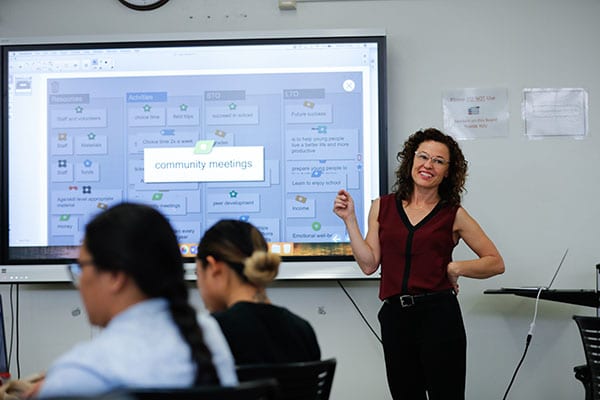
Photo: Jim Gensheimer
Assistant Professor Ellen Middaugh, seen here teaching a class, conducts research focused on youth civic identity development and best classroom practices to build civic engagement.
Ellen Middaugh, an assistant professor of Child and Adolescent Development in the Connie L. Lurie College of Education, may not be able to influence the turnout for the midterm election this month, but her research on youth civic identity development may provide insight into how to increase civic engagement of seemingly elusive youth.
“My interest in civic engagement is really an interest in youth voice, which traces back to my roots growing up in South Carolina where it was clear to me that some people’s voices were given more space than others,” she said. “Whatever I research, my priority is understanding the conditions that support youth voice, especially among those who are marginalized.”
Middaugh recent research has specifically looked at digital media because it presents opportunities for young people to make themselves heard and connect with each other. In her research published in Youth and Society, she and colleagues surveyed more than 2,000 youth ages 15 to 24 to determine how many had witnessed political conflict online, and what types of activities evoked most conflict. She and her colleagues found that more than 40 percent of the youth surveyed said they had witnessed political conflict online, but a much smaller portion had been a direct target (14 percent) and even less said they had made an aggressive comment (7 percent).
In another study published in New Media and Society, she and colleagues showed youth 15 to 25 YouTube videos of a satirical nature about a political issue and then asked questions to see how well they comprehended the messages. As many as 40 percent of those surveyed could not answer basic comprehension questions.
Despite these findings, Middaugh still finds much potential in digital media providing a voice for youth. Through her research, she hopes to understand methods for helping youth become more empowered users of digital media to advocate for themselves and their communities.
“While there is a lot of concern about fake news and incivility in online settings, there is not much to be gained by simply trying to avoid the internet,” she said. “Just as we teach young people to debate in person, we need to understand how to debate online in ways that are informed, responsible and productive. Those who participate in the online public sphere will shape it, so if we want to see it improve in quality, we need to prepare ourselves and the younger generation to do so.”
As an educator of teachers, Middaugh has also conducted research that aims to improve civics and government curriculum and pedagogy, such as an article about iCivics, a suite of online games aimed at teaching about government.
In other research findings she published last spring, she and colleague Chris Evans, of the Civic Engagement Research Group, reviewed the outcomes of a districtwide initiative to increase high school students’ access to civic and digital learning opportunities. They found that in-person interactions did not translate to students’ ability to engage in political discourse online. They did, however, discover that a protected online social network in high school classrooms proved useful for students to practice habits of voicing their views and engaging in dialogue with students from around the country.
“I know some educators are nervous about bringing politics into the classroom for fear of unduly influencing their students or having contentious conversations break out,” she said. “However not discussing politics or only teaching about our political system in terms of technical details or historical precedents can unintentionally communicate that politics is boring, scary or irrelevant to their choice.”
She sees the role of educators as teaching about government and civic participation in ways that are engaging, understandable and help young people see the importance of all kinds of civic actions such as voting, volunteering and activism. They can also help students develop skills such as public speaking, how to discuss controversial issues and engage in civic inquiries so that they can engage in politics.
“Those who are truly involved in their communities in a variety of ways are also more likely to truly understand and have strong opinions about the issues,” she said, noting that we should ask youth to participate in their communities rather than just telling them to vote. “We need to go where youth are and make it clear that their vote matters. Voter registration drives on college campuses are a great resource. However, we have a disparity in participation among youth who do not go to college, so we need more efforts to reach those groups.”